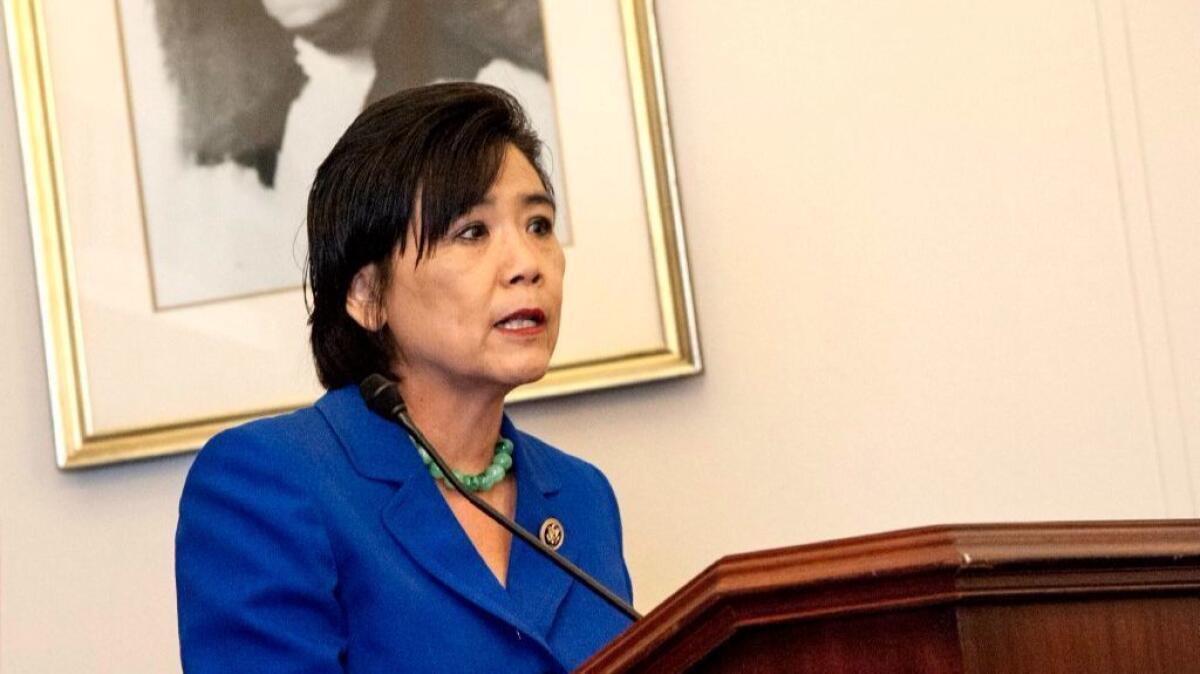Congresswoman demands investigation into law that stymied DEA on opioid enforcement

In September 2016, local Rep. Judy Chu met with then-head of the Drug Enforcement Agency Chuck Rosenberg.
She was reassured by Rosenberg that recently passed legislation related to the oversight of how opioids are distributed, which she cosponsored, “did not interfere with the DEA’s ability to successfully stop bad actors.”
Now, Chu (D-Monterey Park) has written to two powerful congressional committees demanding an investigation after the release of a report from the Washington Post and “60 Minutes” detailing how this little-noticed piece of legislation took away the DEA’s ability to prevent hundreds of millions of painkillers from entering the black market.
She is the second lawmaker to call for an investigation into the Ensuring Patient Access and Effective Drug Enforcement Act, which was signed into law by President Obama in spring 2016. Rep. Peter Welch (D-Vt.), who was also a cosponsor, sent a letter to two congressional committees asking for the law to be reviewed to figure out if it should be altered or repealed.
Chu said in the letter that she asked for the meeting with Rosenberg after the Los Angeles Times published an investigation in July 2016 about how Congress had passed, with little attention and virtually no public opposition, a law that makes it more difficult for government to take action against the pharmaceutical industry.
The article reported on internal dissent within the DEA about this legislation and quoted Joseph Rannazzisi, a former DEA deputy assistant administrator, as saying of Congress: “They are taking the word of industry rather than the government’s expert in diversion control.”
In her letter, Chu explained that in her meeting with Rosenberg last year, she learned that the DEA had had been consulted by legislators about the bill and that the agency felt the “legislation was unnecessary.”
“[Rosenberg] reiterated that it was not the agency’s position that this bill would interfere with the agency efforts to stop harmful opioids from entering our communities,” Chu added.
Last year, The Times also reported how Purdue Pharma, which has reaped more than $31 billion from the painkiller OxyContin, collected extensive evidence suggesting illegal trafficking of its drug and, in many cases, did not share the information with law enforcement or cut off the flow of pills.
One drug ring that Purdue monitored was operating for several years in Chu’s district. As of last year, shortly after the law passed, Chu had received more than $31,000 in contributions from the pharmaceutical industry, according to the nonpartisan Center for Responsive Politics.
The Post and “60 Minutes” found that a DEA lawyer turned pharmaceutical executive actually wrote the draft legislation. This lawyer also testified in favor of the legislation when it was going through Congress.
The change in the law made it harder for the DEA to stop suspicious shipments of narcotics.
“If it had been the intent of Congress to completely eliminate the DEA’s ability to ever impose an immediate suspension on distributors or manufacturers, it would be difficult to conceive of a more effective vehicle for achieving that goal,” DEA Administrative Law Judge John Mulrooney wrote in an article to be published in the Marquette Law Review, according to the Post.
Chu and Welch were two of the bill’s three Democratic sponsors. The legislation was primarily pushed by Rep. Tom Marino (R-Pa.) — who had taken tens of thousands of dollars from the drug industry.
Marino was also President Trump’s pick to be the nation’s next drug czar but withdrew after the Post and “60 Minutes” story ran Sunday.
In a statement to The Times, the DEA didn’t address Chu’s assertion about her meeting with Rosenberg but said, “We will continue fighting the opioid crisis and continue to use all the tools at our disposal to combat this epidemic.”
Chu and Welch asked the House Energy and Commerce Committee and the Oversight and Government Reform Committee to investigate the matter.
ALSO
Opioid law draws scrutiny after Trump’s pick for drug czar steps aside
Embattled congressman Tom Marino withdraws from consideration as drug czar, Trump says
Don’t blame the surgeons: Long-term opioid use rarely starts with surgery, study finds
Nikki Sixx: Take it from a recovering addict, a lot more could be done to end the opioid crisis
More to Read
Start your day right
Sign up for Essential California for news, features and recommendations from the L.A. Times and beyond in your inbox six days a week.
You may occasionally receive promotional content from the Los Angeles Times.







